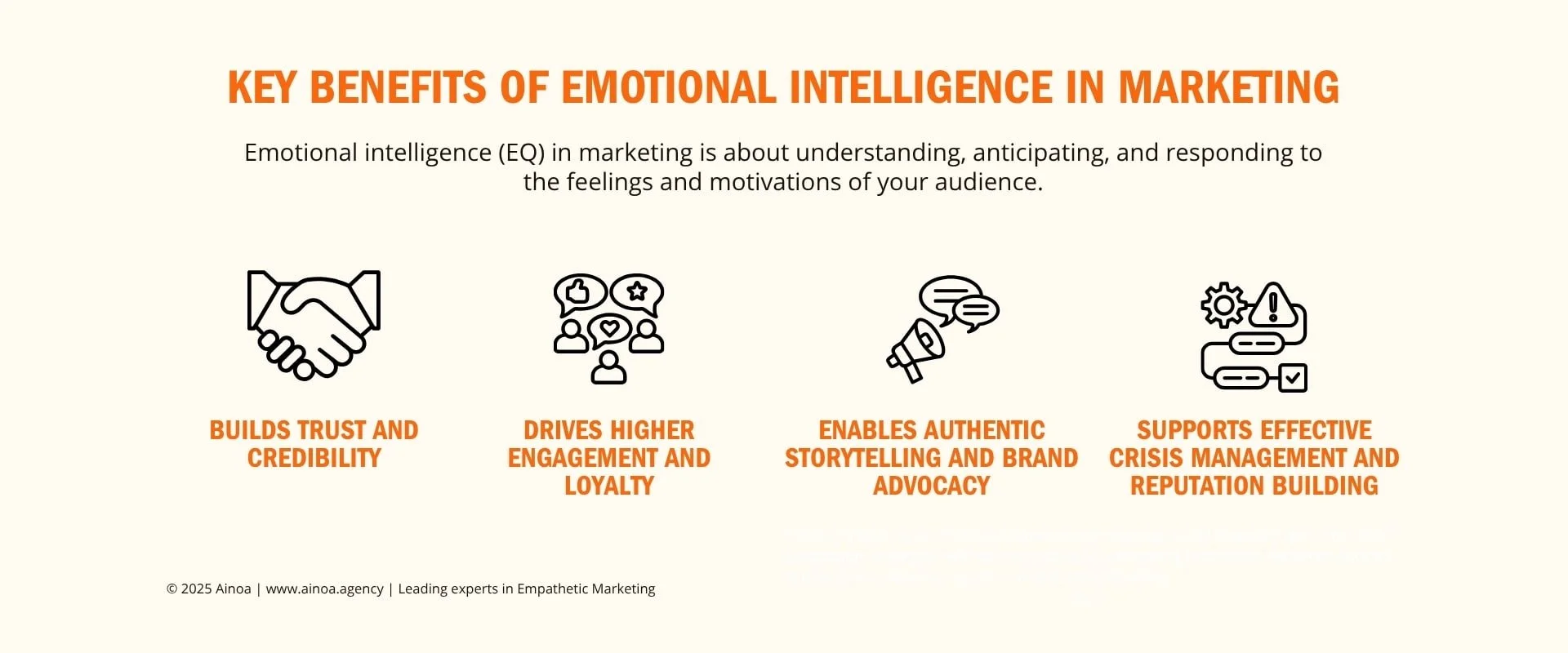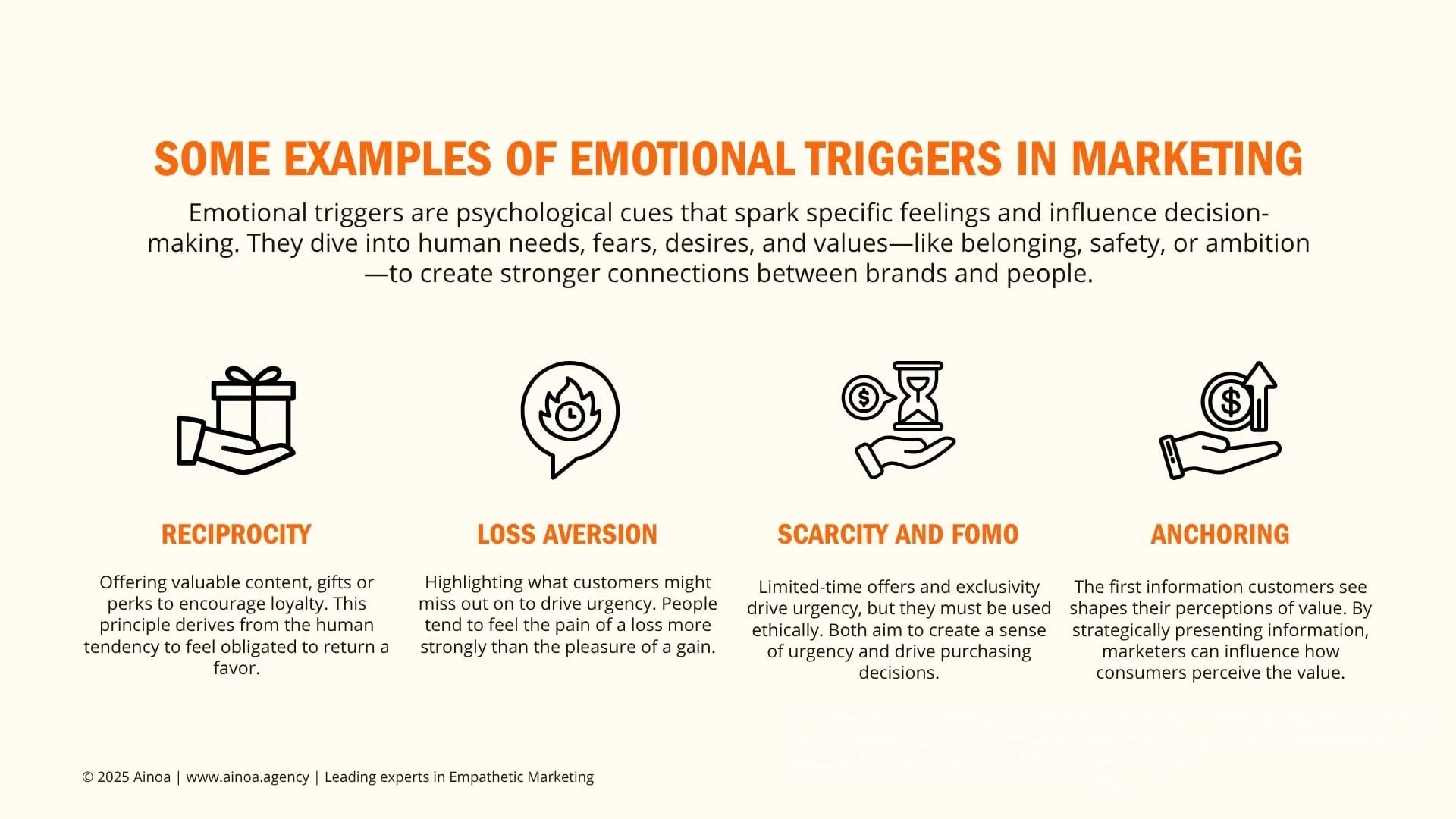The Role of Empathy in Modern Marketing: How Emotional Intelligence Drives Business Success
Quick Answer:
Empathy in marketing has not been a “nice-to-have” in years. It’s the strategic advantage that distinguishes your brand from noisy and fast-paced (and short-lived) competitors. At Ainoa, we see empathetic marketing as the intersection of consumer empathy and psychology, business strategy, and creativity. This approach, rooted in emotional intelligence and inclusivity, ensures our clients are building lasting customer connections, driving loyalty, and delivering sustainable impact.
It is scientifically proven that empathy-led campaigns outperform traditional tactics, with emotionally resonant content driving up to 31% higher engagement and 23% more sales spikes. This article explores why emotional intelligence-based, empathetic marketing is essential for businesses of all sizes, how psychology-driven strategies deliver results, and what the future holds for brands that put people and planet first.
Key Insights (TL;DR)
Empathy in marketing builds trust and loyalty, driving higher sales and customer lifetime value.
Emotionally intelligent marketing outperforms rational campaigns, with emotional ads delivering up to twice the effectiveness.
Psychology-driven strategy enables personalisation and deeper engagement, using data and behavioural insights.
Sustainability and inclusivity are now business imperatives; 81% of consumers expect brands to improve the environment, and 63% of businesses invest in inclusive marketing.
Ainoa’s approach combines creativity, strategy and empathy, delivering premium, holistic solutions for forward-thinking brands.
Why Empathy in Marketing Matters More Than Ever
The Emotional Advantage
We are all bombarded with thousands of ad messages daily, you might wonder how do brands cut through the noise and make a real, lasting impact? The answer lies in empathy. Empathetic marketing—grounded in emotional intelligence and consumer psychology—enables brands to connect with audiences on a deeper level, cultivating trust, loyalty, and advocacy. At Ainoa, we believe that empathy is not just a value, but it should be the starting point of every business.
In a nutshell, empathy-based marketing is about stepping into your customer’s shoes and truly understanding their lived experience, needs, and aspirations. This approach outperforms traditional marketing, building and fostering authentic connections that translate into brand loyalty and advocacy. Empathy is the most powerful force in marketing, regardless of the audience.
Some interesting data behind emotionally intelligent marketing:
70% of consumers are more likely to buy after being emotionally triggered by an advert
According to Statista, 71% recommend brands they feel emotionally connected to
Emotional content in ads performs twice as well as purely rational messaging
68% of customers expect brands to demonstrate empathy, but only 37% feel brands generally do so
Ads with above-average emotional responses generate a 23% sales spike
These statistics reveal a compelling truth: brands that lead with empathy outperform those that rely solely on data or rational appeals.
As I often like to say, empathy is the golden thread that weaves together strategy, creativity, and sustainability. These aren’t separate elements. They’re all expressions of emotional intelligence in marketing. By combining empathy, psychological insight, and sustainable thinking, brands can anticipate emotional needs and create campaigns that resonate deeply and ethically.
This is how brand experiences we create at Ainoa don’t just reach audiences but genuinely move them.
Emotional intelligence in marketing refers to the ability to deeply understand and manage your audience’s emotions and deeper motivations.
Emotional Intelligence: The Marketer’s Superpower
Emotional intelligence (EQ) in marketing is about understanding, anticipating, and responding to the feelings and motivations of your audience. It’s what allows brands to move beyond mere transactional relationships and create meaningful emotional connections.
At Ainoa, we see EQ as the foundation that connects everything modern marketing demands:
Empathy: Emotional intelligence starts with empathy—the ability to step into your customer’s world and understand their lived experiences, needs, and aspirations. This emotional insight drives trust, loyalty, and advocacy.
Consumer Psychology: Emotional intelligence gives marketers the sensitivity to recognise patterns in human behaviour and apply psychological principles (like cognitive biases and emotional triggers) in ways that resonate, not manipulate.
Emotional Triggers: EQ allows brands to create stories, imagery, and experiences that spark genuine emotional responses, inspiring action and forging deeper bonds.
Sustainability and Inclusivity: True emotional intelligence extends beyond one-to-one interactions. It asks brands to consider their emotional and ethical impact on entire communities and the planet, leading naturally to sustainable, inclusive practices that reflect care at scale.
When brands incorporate these elements together through emotional intelligence, they’re not just running campaigns—they’re building relationships that endure and drive sales.
At Ainoa, we don’t treat empathy, psychology, or sustainability as isolated tactics. They’re all part of a bigger picture: a future-proof marketing approach rooted in emotional intelligence.
Key benefits of emotional intelligence in marketing:
Builds trust and credibility
Drives higher engagement and loyalty
Enables authentic storytelling and brand advocacy
Supports more effective crisis management and reputation building
Some examples of psychology and emotional triggers in action:
Reciprocity: Offering valuable content or perks to encourage loyalty
Loss aversion: Highlighting what customers might miss out on to drive urgency
Scarcity and FOMO: Limited-time offers and exclusivity drive urgency, but must be used ethically
Anchoring: The first information customers see shapes their perceptions of value
Storytelling: Narratives that tap into shared values and aspirations create emotional bonds
Key trends shaping consumer psychology in 2025:
Personalisation: Consumers expect tailored experiences but are wary of privacy intrusions.
Transparency: Trust is built through open communication about business practices, especially regarding sustainability and data usage.
Social proof: Reviews, testimonials, and user-generated content are more influential than ever.
Omnichannel expectations: Seamless experiences across digital and physical touchpoints are now the norm.
Emotional intelligence extends beyond understanding customers—it shapes how brands interact with the world. When marketers apply EQ at scale, sustainability and inclusivity become natural priorities, reflecting care for people and the planet alike.
Sustainability and Inclusivity: The New Standard for Brand Success
Sustainability as a Business Imperative
Sustainability is an expectation for all brands in 2025. According to Microsoft’s global study, 81% of global consumers believe companies should help improve the environment, and 88% prefer sustainable purchases. Brands that integrate sustainability into their marketing not only reduce their environmental impact but also enhance their reputation and customer loyalty.
Top sustainable marketing trends for 2025:
Eco-friendly media buys: Choosing platforms and partners with strong ESG credentials
Carbon-positive product design: Brands are moving beyond neutrality to processes that restore environmental balance.
Circular models: Subscription and recycling initiatives are gaining traction, especially among younger, eco-conscious consumers.
Transparent reporting: Measuring and communicating the carbon footprint of marketing efforts is now standard practice.
The Rise of Inclusive Marketing
Inclusive marketing is about representing and celebrating diversity, ensuring all consumers feel seen, valued, and included. According to a recent 2025 Hubspot study, 63% of businesses are investing in inclusive marketing, and 74% of marketers report a shift in consumer preferences towards inclusivity.
According to the same study:
Inclusive ads deliver 5% higher short-term sales, 16% higher long-term sales, and a 62% greater likelihood of being a customer’s first choice.
Brands that fail to embrace inclusivity risk losing relevance and market share in an increasingly multicultural world.
Best practices for inclusive marketing:
Collaborate with underrepresented communities to create authentic content.
Avoid tokenism by developing a deep understanding and genuine partnerships.
Regularly audit campaigns for representation and accessibility.
Emotionally intelligent marketing is also sustainable and inclusive.
FAQ: Empathetic Marketing, Consumer Psychology, and Sustainable Marketing
Q: Why is empathy important in marketing?
A: Empathy enables brands to connect with customers on a deeper level, building trust, loyalty, and advocacy. It’s proven to drive higher sales and customer lifetime value.
Q: How does emotional intelligence improve marketing outcomes?
A: Emotionally intelligent marketing results in higher engagement, loyalty, and sales. Campaigns that evoke strong emotional responses are twice as effective as those relying solely on rational content.
Q: What role does sustainability play in brand success?
A: Sustainability is now an expectation. Brands that integrate eco-friendly practices and transparent reporting attract and retain loyal, value-driven customers.
Q: How does psychology influence marketing strategy?
A: Consumer psychology helps marketers understand decision-making, tailor messages, and design campaigns that resonate emotionally, leading to more effective and memorable marketing.
Q: What are the latest trends in sustainable marketing?
A: Key trends include carbon-positive product design, circular subscription models, transparent reporting, and integrating sustainability into every aspect of the marketing mix.
Q: How can brands ensure their marketing is inclusive?
A: By investing in diverse teams, co-creating content with underrepresented communities, and making inclusivity central to their strategy, not just an afterthought.
At its core, emotional intelligence unites empathy, psychology, inclusivity, and sustainability into one holistic approach. It’s not about tactics; it’s about building brands that feel human and act with integrity at every touchpoint.
The Ainoa Perspective
At Ainoa, we see empathy, psychology, and sustainability as inseparable pillars of modern marketing. Our team’s expertise—spanning business strategy, creative direction, and psychological insight—enables us to deliver holistic solutions that are not only effective but also ethical and future-proof. Partnering with an agency that shares your values is more than a strategic choice—it’s a statement of intent.
Empathy is not just a trend; it’s the future of marketing. Brands that listen, adapt, and act with integrity will lead the way in a rapidly changing world. — Salla Västilä, Founder and CEO of Ainoa
At Ainoa, we see empathy, psychology, and sustainability as inseparable pillars of modern marketing.
Conclusion: Building a Better Future with Empathetic Marketing
Empathy, emotional intelligence, and sustainability are the cornerstones of marketing success in 2025 and beyond. Brands that embrace these principles (supported by psychology-driven strategy and genuine inclusivity) will not only outperform their peers but also help shape a more equitable and sustainable world.
At Ainoa, we’re proud to lead this movement, partnering with visionary leaders who believe in the power of marketing to drive positive change.
For more on Ainoa’s story and values, visit www.ainoa.agency/our-story.





